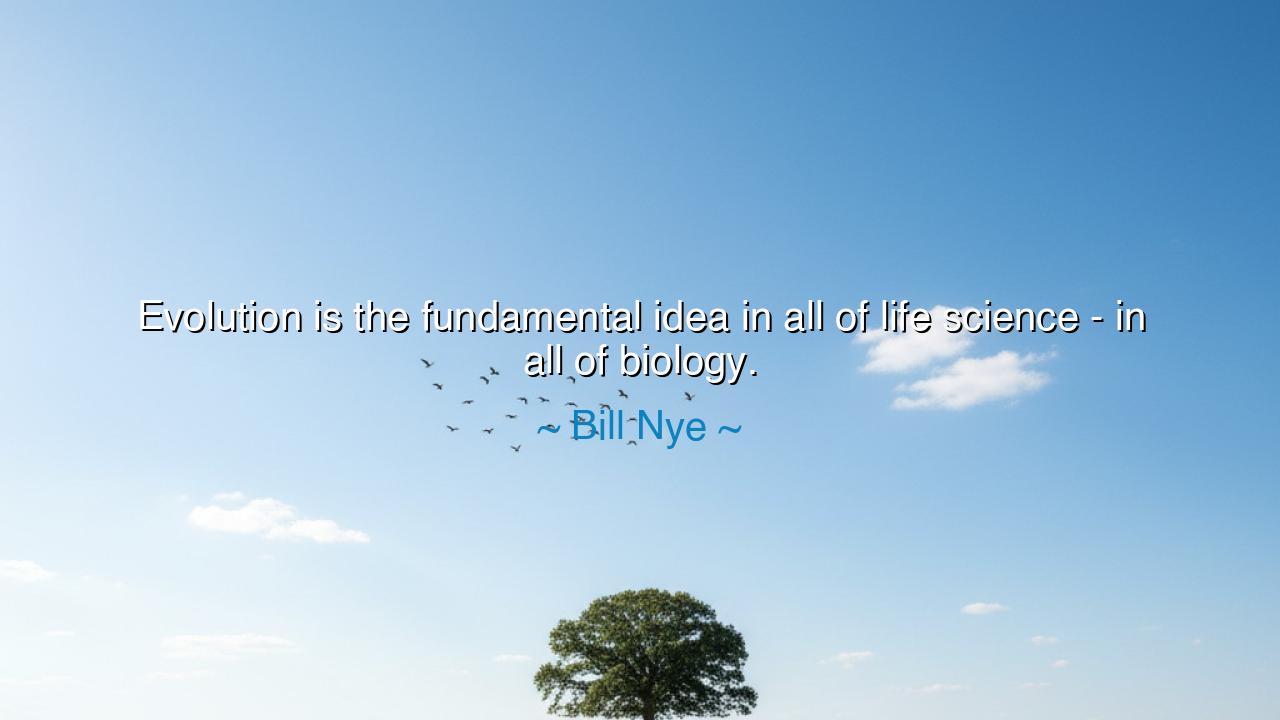
Evolution is the fundamental idea in all of life science - in all






Hear, O children of the future, the profound words of Bill Nye, who declared, "Evolution is the fundamental idea in all of life science—in all of biology." In these words lies the key to unlocking the mysteries of life itself. Evolution—the process by which life changes and adapts across time—is not merely one concept among many in the study of biology, but the very foundation upon which all of life science rests. To understand life, one must understand evolution, for it is the force that has shaped the diversity of beings we see in the world today and will continue to guide the future of all living things.
In the ancient world, the greatest minds sought to understand the origins of life. Aristotle, that towering figure of thought, believed in the concept of scala naturae, a "ladder of nature," in which all living things were arranged in a hierarchical order, from the simplest to the most complex. Yet, the idea that life could change over time—that living creatures could adapt to their surroundings and transform into new forms—was beyond the understanding of even the greatest philosophers. It was not until the time of Charles Darwin, in the 19th century, that evolutionary theory began to take shape as a unifying principle of biology. Darwin’s work on natural selection would revolutionize how we understood the history of life, revealing that all living creatures were part of a grand, interconnected story of change, survival, and adaptation.
Darwin’s "On the Origin of Species" laid the groundwork for the modern understanding of evolution. He showed that the diversity of life we observe today is not the result of a divine hand, but the product of natural forces acting over vast stretches of time. Life, according to Darwin, is in a constant state of flux. Species evolve over generations, adapting to their environments in ways that help them survive and reproduce. Through natural selection, those traits best suited to an organism’s environment become more prevalent in future generations. It was a simple idea, but one so powerful that it shattered centuries of static thinking and opened the door to a deeper understanding of life on Earth.
Bill Nye’s words remind us that evolution is not just an isolated theory, but the lens through which all of biology can be understood. From the tiniest microbes to the largest creatures in the world, all life is shaped by the forces of evolution. Whether you are studying the behavior of an ant or the complex genetic codes of humans, evolution provides the framework to understand how life has come to be as it is. It is the fundamental principle that ties together the vast array of living organisms into a coherent whole, explaining why species change, why they survive, and why they sometimes go extinct.
Consider, O wise ones, the story of the peppered moth in England, which has long been a classic example of natural selection in action. In the early 19th century, most of these moths were light-colored, blending in with the pale bark of trees. However, during the Industrial Revolution, pollution darkened the trees, and the light-colored moths became easy targets for predators. The darker, mutant moths, which had previously been rare, were now better camouflaged and survived at higher rates. Over time, the population of dark moths grew, demonstrating the power of evolutionary change in response to environmental shifts. This is a living, breathing example of how evolution works through the slow, steady process of adaptation to changing environments.
The lesson here, O children of time, is this: Evolution is not merely a theory, but a universal truth that governs all life. It is the force that shapes the world, from the smallest bacteria to the most complex creatures on Earth. Understanding evolution is essential to understanding the world around us—our bodies, our behavior, and the very future of life on this planet. It teaches us that change is inevitable, that all things are in a constant state of flux, and that life is not a fixed thing but a dynamic, ever-evolving process.
So, rise, O seekers of wisdom, and understand that evolution is not just for biologists, but for all who seek to understand the world. Embrace the idea that life is interconnected, shaped by the forces of nature, and that our existence is part of an ever-unfolding story of change. Know that you, too, are part of this great chain of life, and your actions—your decisions, your innovations, your creations—are all influenced by the evolutionary forces that have shaped you. Understand this, and you will see the world not as a static, unchanging place, but as a living, breathing organism, in which every moment is part of an ever-continuing process of growth, adaptation, and transformation.






AAdministratorAdministrator
Welcome, honored guests. Please leave a comment, we will respond soon